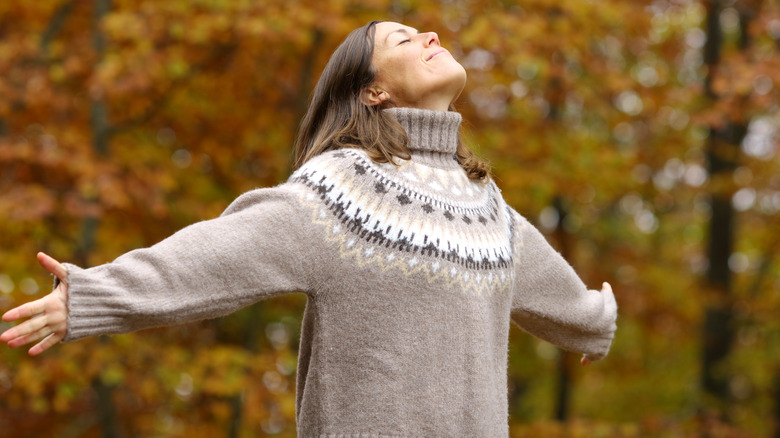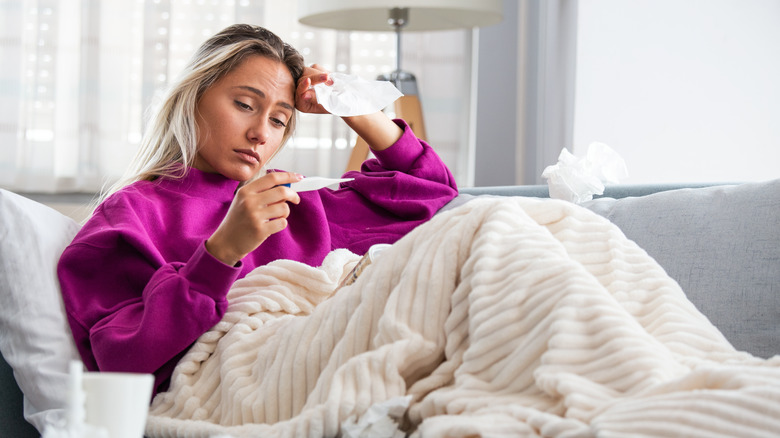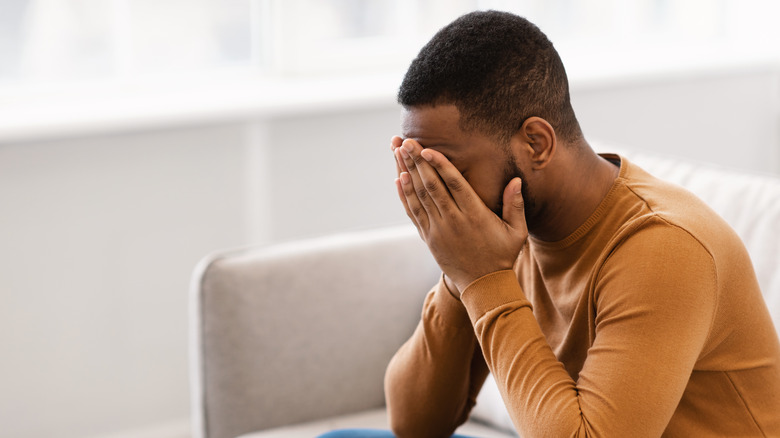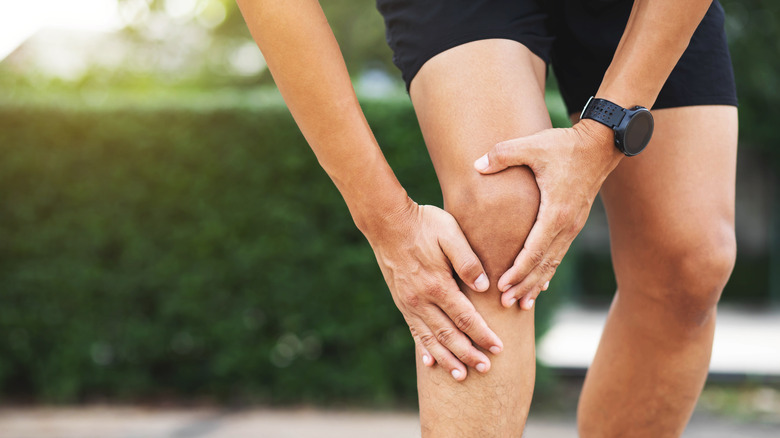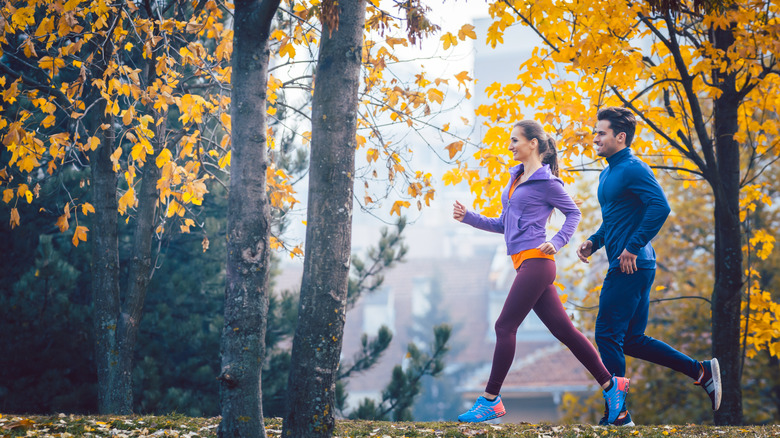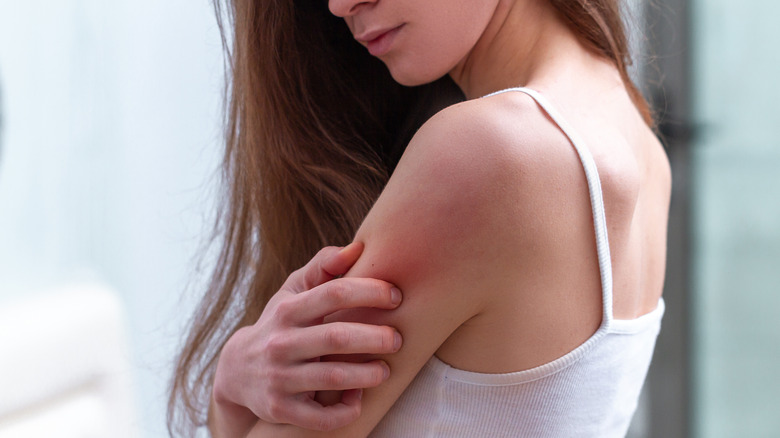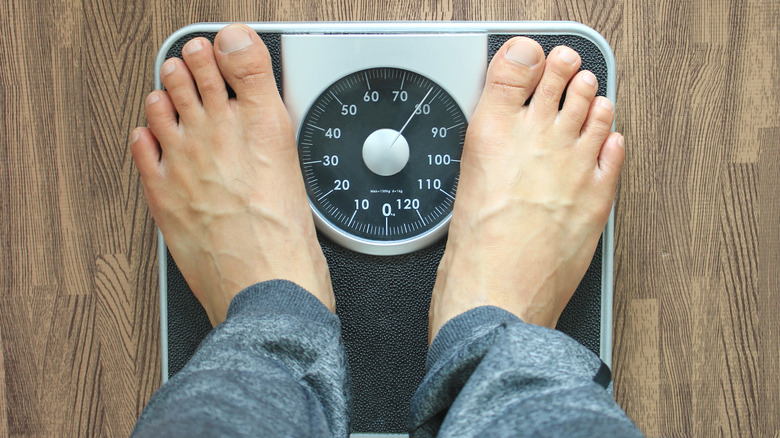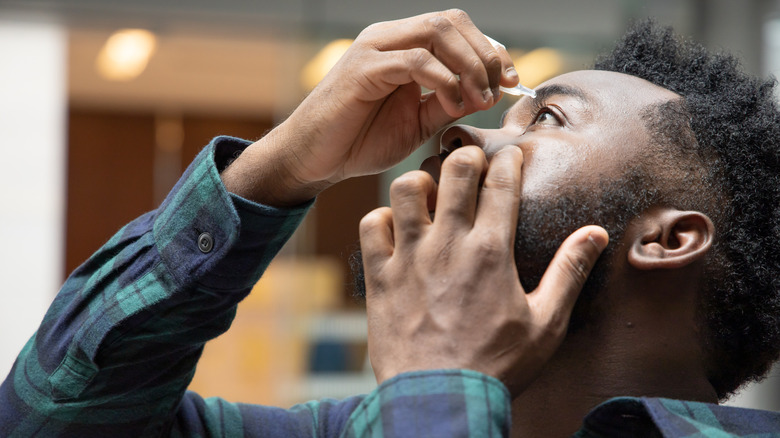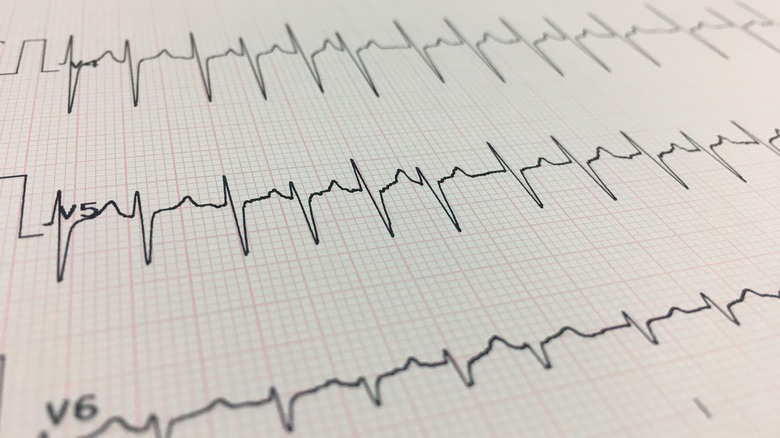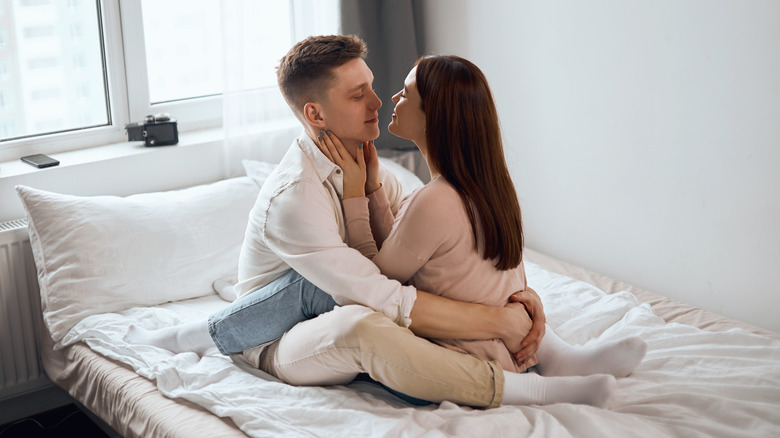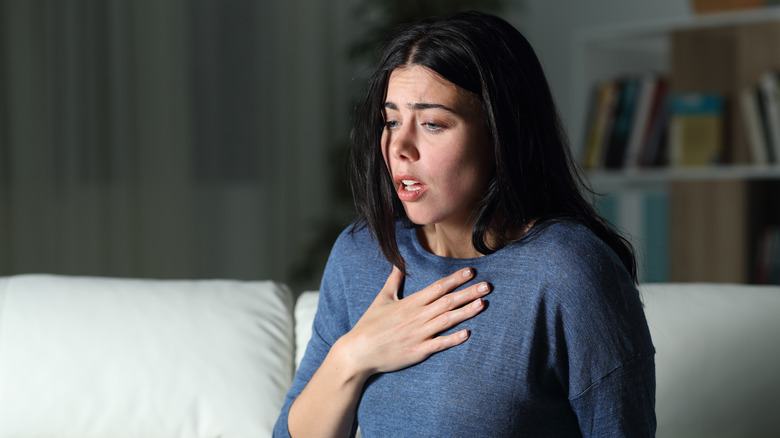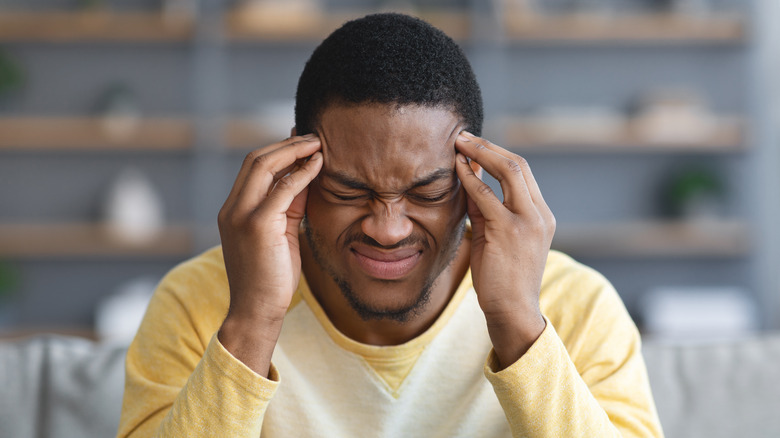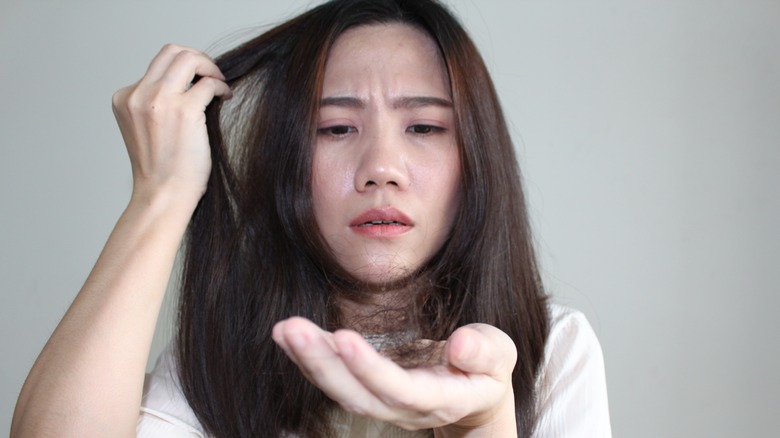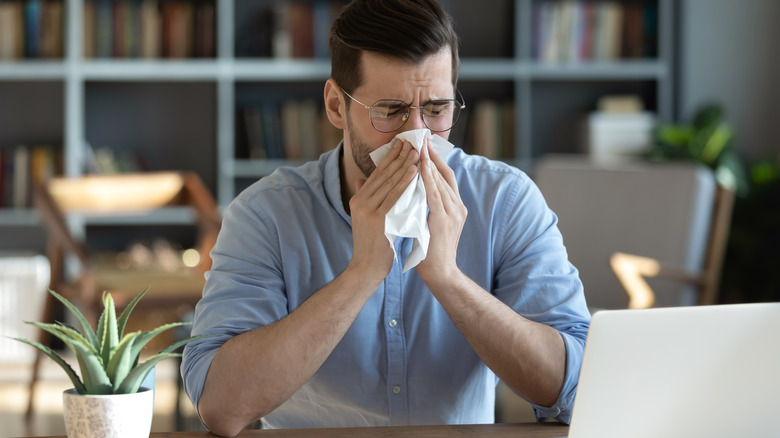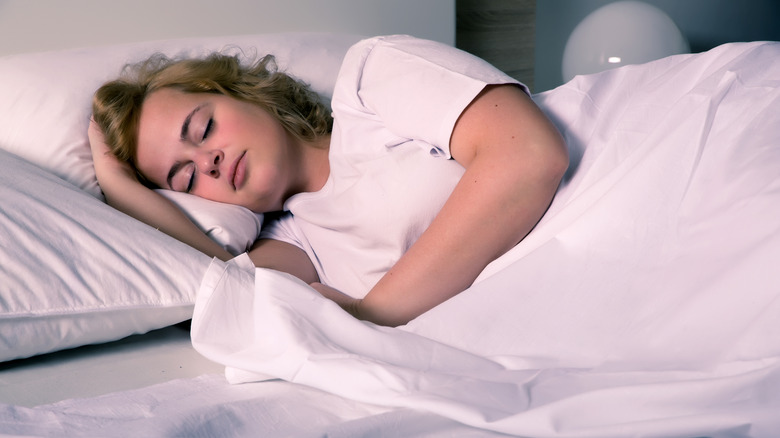Strange Things That Can Happen To Your Body In The Fall
Ah, autumn! It's the season of golden yellow and crimson leaves, shorter days, and cooler nights. Coats and scarves return to the front of the closet, and everywhere you go there's a promise of pumpkin-spiced something waiting for you.
But with all these external indicators of fall smacking you in the senses, did you know that actual physical and mental changes take place in your body as well? This includes apprehension about the season itself. "It's very common for people to feel this [anxiety] during autumn because they are anticipating the variety of stressors that come with colder weather and the end of the calendar year," according to Dr. Carrie Landin, a psychologist with UCHealth Integrative Medicine Center in Colorado. "When we know there is the potential for stress ahead, we tend to anticipate the problems, feeling anxious before they even happen," she told The Healthy.
Biological processes show variation during different seasons right down to the cellular composition of blood, according to a study reported by Wired. Yes, our bodies are much more sensitive to seasonal changes than we might even realize, and the more we understand what's happening, the better off we'll be in recognizing and adapting to it. So let's take a closer look at some of the most surprising, and even strange, things that happen to us in the fall.
You get sick more
It's not just an old wives' tale. When the weather shifts you really are more susceptible to colds and flu. Fall is also the peak time for bronchitis, ear infections, cold-induced asthma, and other conditions that crop up along with their barrage of yucky symptoms like runny nose, sore throat, wheezing, and congestion (via Family Care Centers Medical Group).
Just what is it that brings on all this nastiness in what could otherwise be a truly amazing time of year? According to Time, the swings in barometric pressure and temperatures set up a fertile breeding ground for viruses that irritate airways. As demonstrated by a Yale study, the common cold, or rhinovirus, replicates much easier at cooler temperatures.
"Changes in weather are basically challenges to our immune system and to our musculoskeletal system," Dr. Vikash C. Modi, a board-certified family medicine practitioner with Piedmont Healthcare in Atlanta, Georgia, told Living Better. "Our bodies get used to a certain climate, and when those things change suddenly, our body has to try to adapt," he continued. "Unfortunately, sometimes our bodies have a difficult time adjusting, which can trigger an illness." So maybe your mom was right after all when she told you to wear a sweater and bundle up in the cold!
You feel depressed
There's just something a little bit depressing when the long, glorious days of summer come to an end with the ushering in of fall. And if you live in a region that follows daylight saving time, when clocks "fall back" an hour, the abrupt curtailing of daylight has an even fiercer kick to the psyche. Sunset by 5 p.m. — oh the horror! If you've worked a regular day shift you'll know all too well the gloomy feeling of waking up in the dark and coming home in the dark. It's like all you do is work, eat dinner, and go to sleep.
If the darkness of the season makes you unbearably joyless for many days on end, and you're having trouble sleeping (or, conversely, are sleeping too much), then the Mayo Clinic reports you may have a case of seasonal affective disorder (or SAD). It's two to four times more common in women than men, and especially prevalent in the Northern U.S. and Canada, according to the Yale School of Medicine.
Although exact causes are unknown, it's thought to be triggered by a disruption to your circadian rhythm (your body clock), as well as a change to your serotonin and melatonin levels. Fortunately, light therapy and other doctor-prescribed therapies can bring relief.
Your joints get achy
Ouch! Do your back, neck, knees, and other joints get agonizingly achey as the crisp chill of fall rolls in? If so, you're not alone! The aches and pains you're suffering are experienced by a whole lot of people.
Arthritis suffers account for 23% of all adults in the United States, and seasonal joint flareups affect this group especially hard. "Those with arthritis, neck pain or other types of musculoskeletal issues tend to report the most weather-related pain," says Dr. Robert Bolash, pain management specialist for the Cleveland Clinic in Ohio.
Theories abound in the scientific community, but anecdotal evidence suggests that barometric pressure is the biggest culprit when changes to weather bring on pain in the joints. "If the barometric pressure decreases, our joints and muscles expand. In someone that already has inflammation in a joint, this can result in pain," says Dr. Geoffrey Van Thiel, a board-certified orthopedic surgeon with Ortho Illinois (via The Active Times). So maybe, just maybe, your grandpa's aching knees really can predict the weather.
Your body makes more brown fat
What the heck is "brown fat" and why would you want it? Even though it doesn't sound so appealing, it's essential stuff when temperatures drop. "Brown fat can actually create heat," explained Nataliya Galifianakis, a clinical assistant professor of biology at New York University, to AccuWeather. "Brown fat cells instead of using calories to make energy, it uses calories to produce heat."
Unlike white fat, which are large cells under the skin and concentrated around the belly, arms, buttocks and thighs, according to Healthline, you'll only find brown fat in small amounts and just in critical areas around the neck, aorta, kidneys, and spine (via Nova).
The secret sauce in brown fat is its abundance of mitochondria, which are deposited like cushions around major blood vessels to warm the blood and generate heat to maintain core body temperature when it's cold. Physiologist Yossi Rathner at the University of Melbourne told Nova, "If vasoconstriction is closing the window, brown fat is turning on the heater."
You see changes in your skin
When the crisp fall days and evenings arrive, the season also brings with it drier conditions for our skin. The cold outdoor air combining with relentless indoor heat from furnaces, fireplaces, and hot showers can make skin cry out for moisture. Low humidity levels also leave you with that crackly, uncomfortable feeling.
"Cold air can be intensely drying," Dr. David E. Banks, founder and director of the Center for Dermatology, Cosmetic and Laser Surgery in New York, explained to Everyday Health. And watch that water temperature, too. Philadelphia dermatologist Dr. Nazanin Saedi put it this way when speaking to The Healthy: "It's tempting to take a long, hot shower when it's freezing outside, but that's the exact opposite of what your skin needs." Adding in a heavy moisturizer with humectants to your daily routine will help lock in water to your skin's top layer and provide a protective barrier to harmful drying elements (via the Mayo Clinic).
Lack of adequate hydration also contributes to dry skin. Unlike in the warm months of summer when you're thirsty for H20 to combat the sweltering heat, you're probably less inclined to fill up with a tall glass of water when it's blustery and cold.
You gain weight
Tasty temptations are all around us in fall. You've got the all-important Halloween, essentially a costumed candy gorge fest, followed closely by the giant carbo-loading Thanksgiving feast. "When the weather turns colder, we generally adjust our eating styles to warm comfort foods associated with family events and holidays," Dr. Brenda Rea, family and preventive medicine physician at Loma Linda University Health in California, told Best Life.
Even if you abstain from the treats, the mere stress of holidays approaching can pack on pounds. "Stress can have a number of negative effects on your body," explained Jennifer McDaniel, a private practice dietitian in St. Louis, Missouri. "It increases ghrelin, your hunger hormone, as well as cravings. Stress also increases cortisol," she said to Everyday Health. Cortisol is a naturally occurring steroid hormone that regulates metabolism. Too much of it can lead to weight gain and particularly dangerous belly fat, reports Orlando Health.
Your eyes dry out
You may think it's just springtime when allergies flair, but fall is also a peak time for watery, red, and itchy peepers. "Across the United States, the number one fall allergy trigger is ragweed, mainly because the plant dominates the southeast part of the country," Dr. Inderpal Randhawa, a Los Angeles-based physician, board certified in clinical immunology, allergy, and pulmonary medicine, told Everyday Health.
Seasonal changes in weather, humidity, and temperature all make dry eyes worse, according to IOVS Journal, the official publication of the Association for Research in Vision and Ophthalmology. Allergens and dry air both contribute to eyes that feel parched like the Sahara desert (via Healthline). In a survey of Boston residents, fall and winter saw the most complaints of chronic dry eye.
As Dr. Catherine Monteleone, an allergist-immunologist in New Jersey, told Yahoo, "If you tend to have a bad month or two, starting in late summer, you're probably dealing with fall allergies."
Your heart rate speeds up
That extra pitter-patter of your heart in autumn isn't so much about your love of pumpkin pie. No, it's an actual physical change that occurs when you're plunged into a colder environment. When temperatures dip, what's your instinctive response? You shiver. Shivering is the quick contracting and relaxing of your muscles and is your body's clever way of warming up (per Healthline).
Cold weather also narrows your blood vessels. This physical change makes your heart work harder and faster to pump the blood and causes your blood pressure to rise. Not a biggie if you have no underlying health conditions, but these changes can add strain to your system and be particularly impactful if you have cardiovascular disease (via Medical Associates of Northwest Arkansas).
"In colder weather, we typically see rates of heart attacks go up," Dr. Edo Paz, a New York City-based internist and cardiologist, told Best Life. "There are various reasons for this, including increased blood pressure and increased risk of blood clots. The best way to mitigate this risk is to dress warm."
Your libido gets charged up
You might think that the skin-baring fashions of summer would make it the most getting-it-on season of all. However, a study published in Perception says otherwise. It found that heterosexual men rated women as least attractive in the summer. "During summer, men become habituated to seeing women in scant bathing suits, shorts, and skimpy dresses," clinical psychologist Dr. Carla Manly told Newsweek. "In accord with the general law of supply and demand, bare flesh seems to become more alluring as it becomes less available."
So, wooly hats and sweaters are the new sexy? Well, it's a little more involved than that. The sex hormone testosterone is highest in the fall and lowest in the summer for both sexes. And in women, the boost is even more pronounced, according to Psychology Today. Fertility rises too. This leads to an increased sex drive and that frisky feeling all around. As a result of all that lovin', not surprisingly, a whole lot of babies are being born in late summer (via Live Science).
You feel especially stressed out
You just can't cope. Your heart is pounding and your mind is drowning with fear. Autumn anxiety can really take a toll on our well-being. Sure, everyone experiences stress, but interestingly, Everyday Health reports the feeling of being emotionally overwhelmed can be especially hard-hitting in the fall.
The shortened daylight hours of autumn and, consequently, reduced exposure to vitamin D-producing ultraviolet rays is one likely trigger. "Lack of [vitamin D] has been linked with depression," Dr. Clare Morrison, medical advisor at MedExpress, told to Healthline. "Other factors include behavioral changes, because as the weather deteriorates we spend less time outdoors and do less exercise."
Autumn anxiety also runs rampant during the holidays. Although a joyful time for many, it can magnify feelings of loneliness, despair, and financial distress for others (via WebMD). New York City psychologist Patricia Thornton told Healthline, "If you anticipate you are getting into the cooler months and the holidays are coming, and you're not sure how you'll deal with Thanksgiving, there can be a lot of stress — especially if you think you should be happy because it's a celebration."
You have more migraines
If you know a migraineur, you know the hell they often go through when one of these severe headaches strikes. Yet despite this being such a common neurological condition — some 39 million people in the United State get migraines, according to the Migraine Research Foundation – there are many theories but still no real consensus on what actually causes them (via Johns Hopkins Medicine).
WebMD cites many risk factors and common triggers, and one of the biggest is changes in weather and barometric (or atmospheric) pressure. When temperatures swing from the heat of summer to the cool of fall, that shift pretty reliably instigates a migraine, says the National Headache Foundation. In the fall season, migraine sufferers not only battle temperature fluctuations but also an unfortunate cocktail of shorter days that disrupt circadian rhythms and sleep patterns, reports the American Migraine Foundation.
Dr. Cynthia Armand, a neurologist with Montefiore Medical Center in New York explained it this way to the American Migraine Foundation: "When there's a change in that atmospheric pressure, it creates a change, kind of like a shift, between what you're experiencing in your head and what's going on in the air." Dr. Vince Martin, professor of medicine and migraine specialist at the University of Cincinnati told Yahoo, "We don't know all the specifics of migraine. You'd think it would be a simple thing, but it's a very complex biologic and neurologic event."
Your hair sheds more
We know our dogs shed fur, but did you know that we as experience have seasonal hair shedding? Now, don't get too panicky, our hair has regular, normal shed cycles during the year. But according to one 2017 study, it's in summer and autumn when you can expect to see even more clumps of tangled hair on your brush or slipping away down your shower drain.
So how much hair loss are we talking about? Well, the experts at the American Academy of Dermatology say losing up to 100 strands per day is normal. But in the fall, that number can increase. This is just part of our hair's typical cycle of growth, transition, and rest (per WebMD).
Dr. Francesca Fusco, a board-certified dermatologist in New York City revealed to Well+Good, "During the summer months, we tend to hold onto more hair to protect our scalp from UV light. So, it only naturally follows that if one season you're holding onto the hair, the following season is when you shed." Additionally, Miami dermatologist Dr. Roberta Del Campo told Allure, "The idea is that more hairs than normal are shed to make way for a thicker head of hair for the winter."
You sneeze more
Spring may be the superstar of allergy seasons, but its pumpkiny cousin, fall, is a close runner-up in keeping your throat itchy and your nose drippy. Mold growing from damp basements and leaf piles, and pollen from ragweed in particular, are all fall season irritants that can really get your immune system angry, according to Prevention.
When the body encounters allergens, it releases histamines which then trigger sneezing and other allergic reactions (via Healthline). Since ragweed and other pollen are abundant in fall, it's prudent to avoid the most sensitive times outside. "Pollen counts are highest from early morning until 10 a.m., so try to postpone your activity until later in the day," Dr. Rachna Shah, allergist and faculty member of Loyola School of Medicine, told Prevention.
You should also be vigilant about specific symptoms: fever, shortness of breath, or loss of smell or taste are not induced by allergies. Don't delay in talking to your doctor if you're experiencing any of those conditions (via WebMD). Better safe than sorry!
You sleep better
Don't we all just want to snuggle up in bed under a fluffy duvet when it's dark and chilly outside? When daylight hours are in short supply like they are in fall, it's much easier to call it a night and get to bed earlier to catch those much-needed Zs.
"Light is energizing and keeps melatonin [a hormone that helps regulate the sleep-wake cycle] down. So when it starts getting darker earlier, our brain starts thinking it's time to get sleepy earlier," Dr. Shelby Harris, a board-certified behavioral sleep medicine specialist, confirmed to Well+Good.
Experts recommend that adults get at least seven hours of sleep a night, which is much easier to do when you go to bed earlier (via Mayo Clinic). The benefits of getting adequate sleep are many, and as reported by The Healthy, include being less cranky and more refreshed. So embrace the shorter days of autumn and get some rest!

